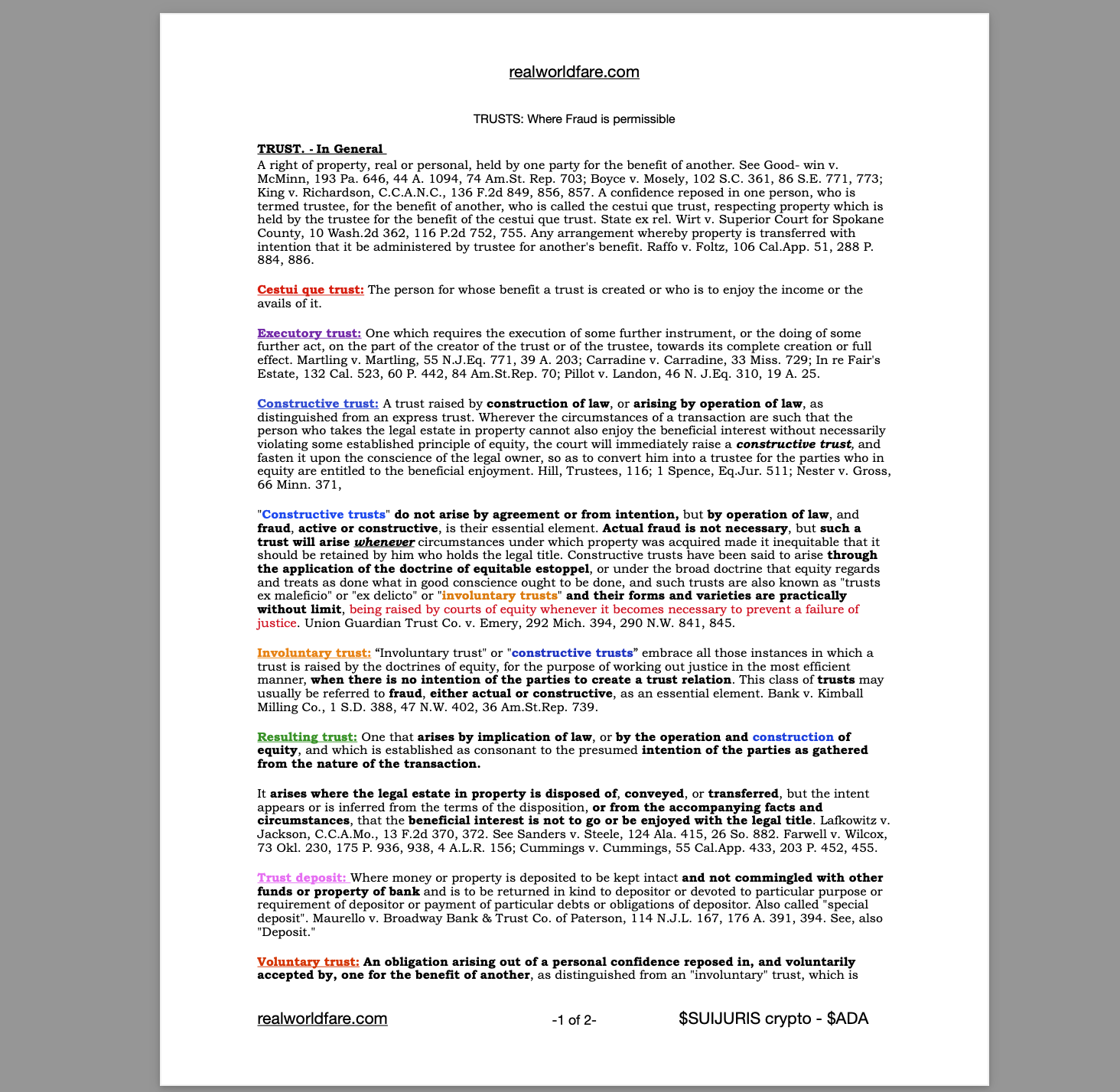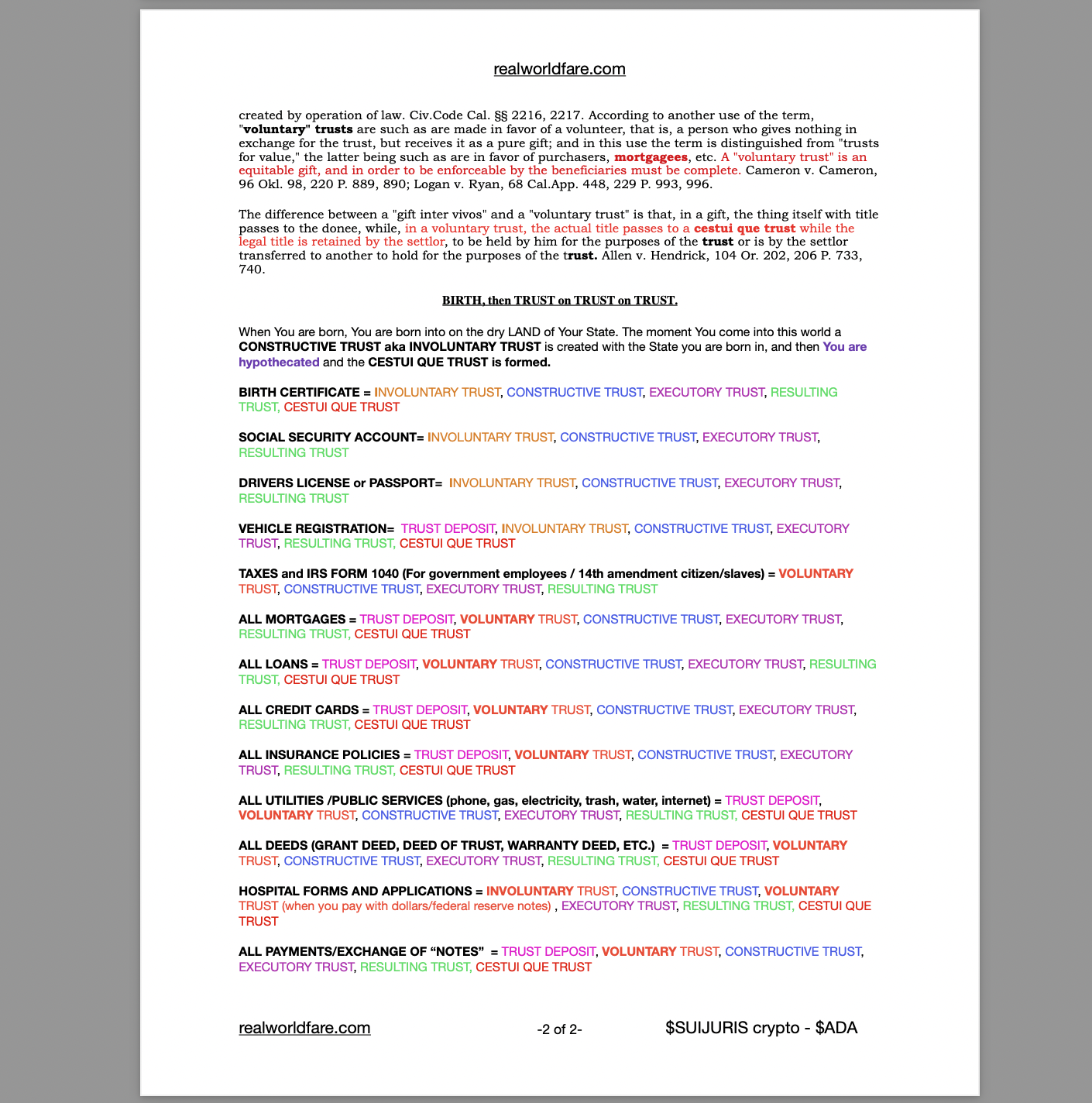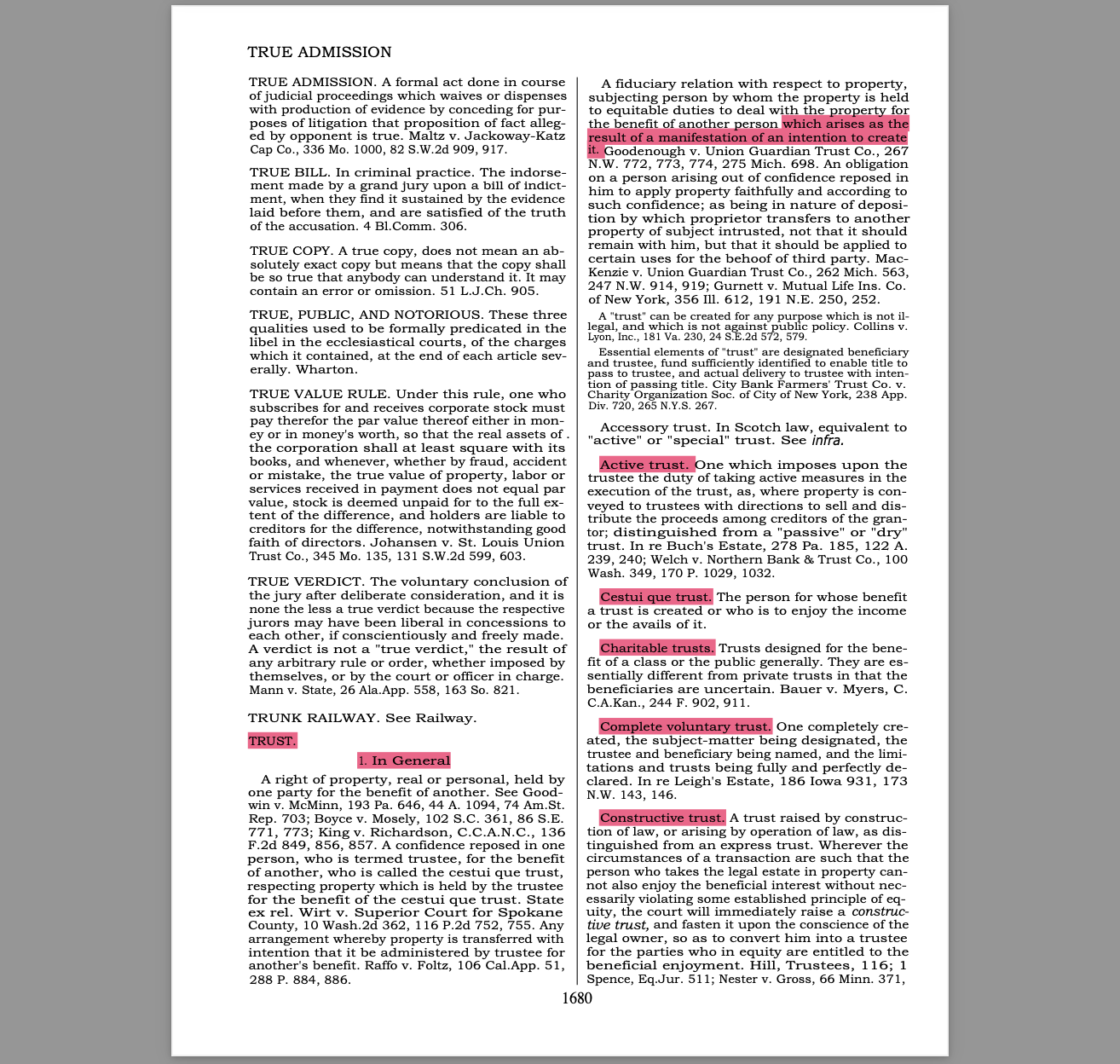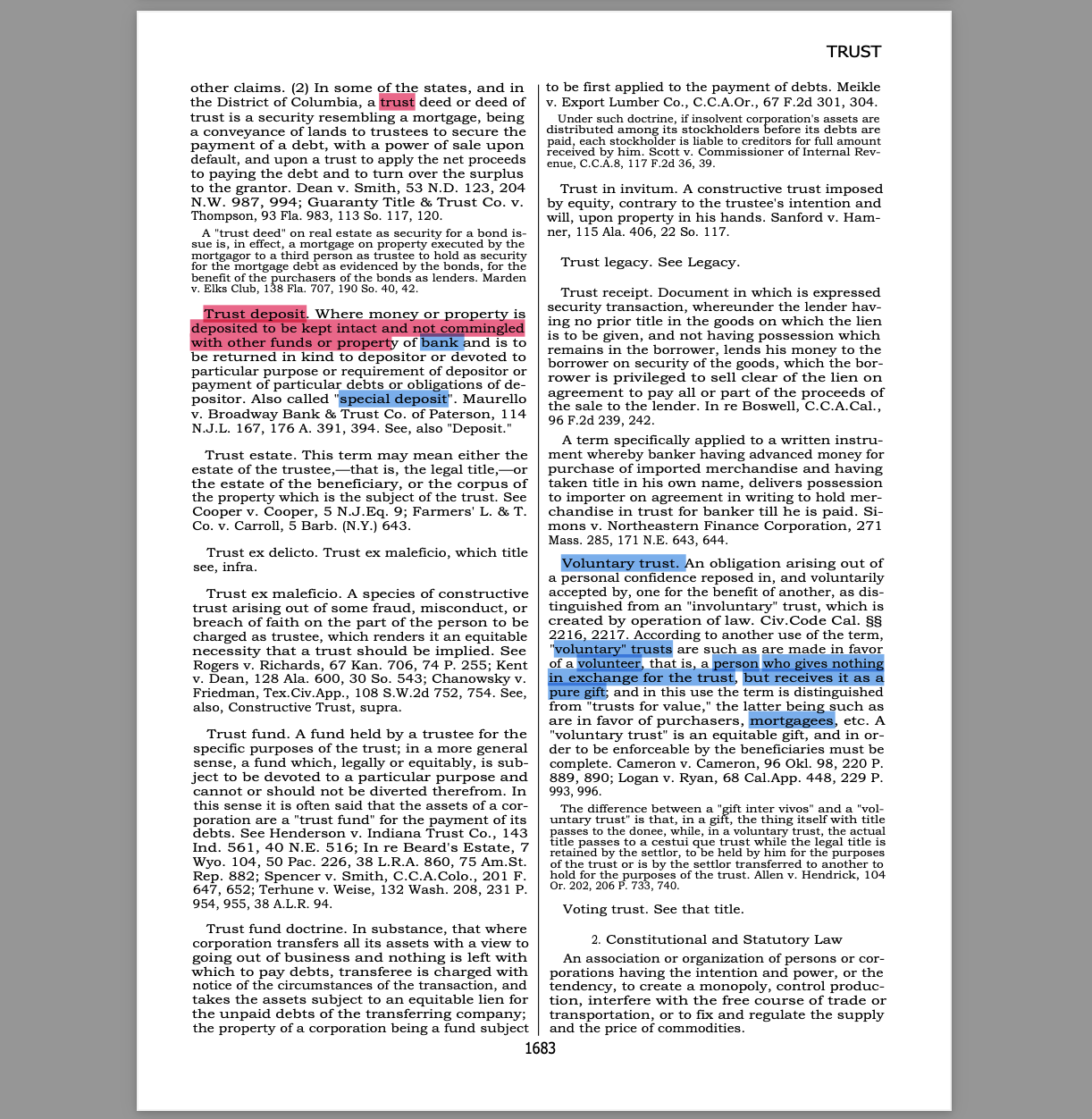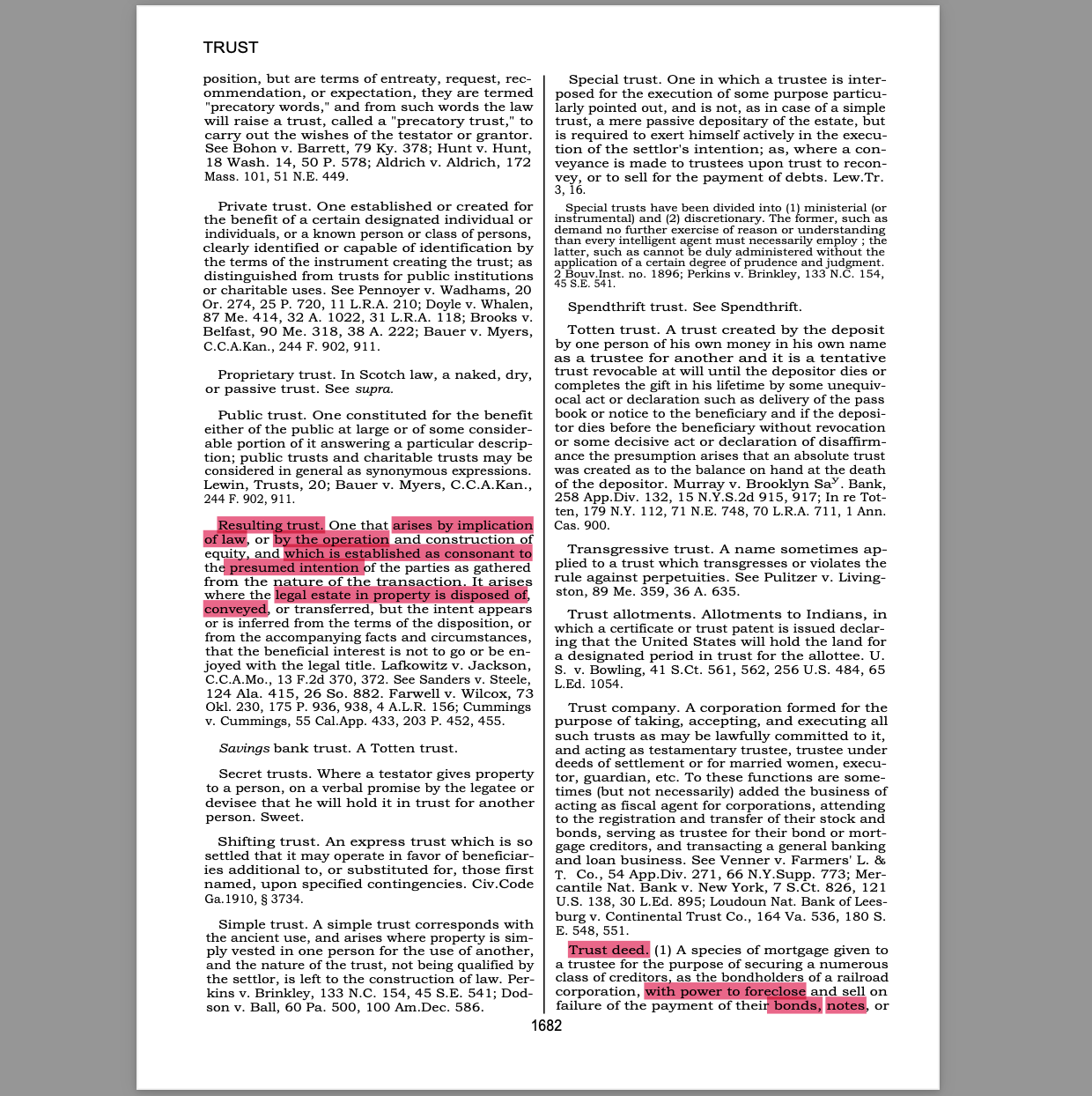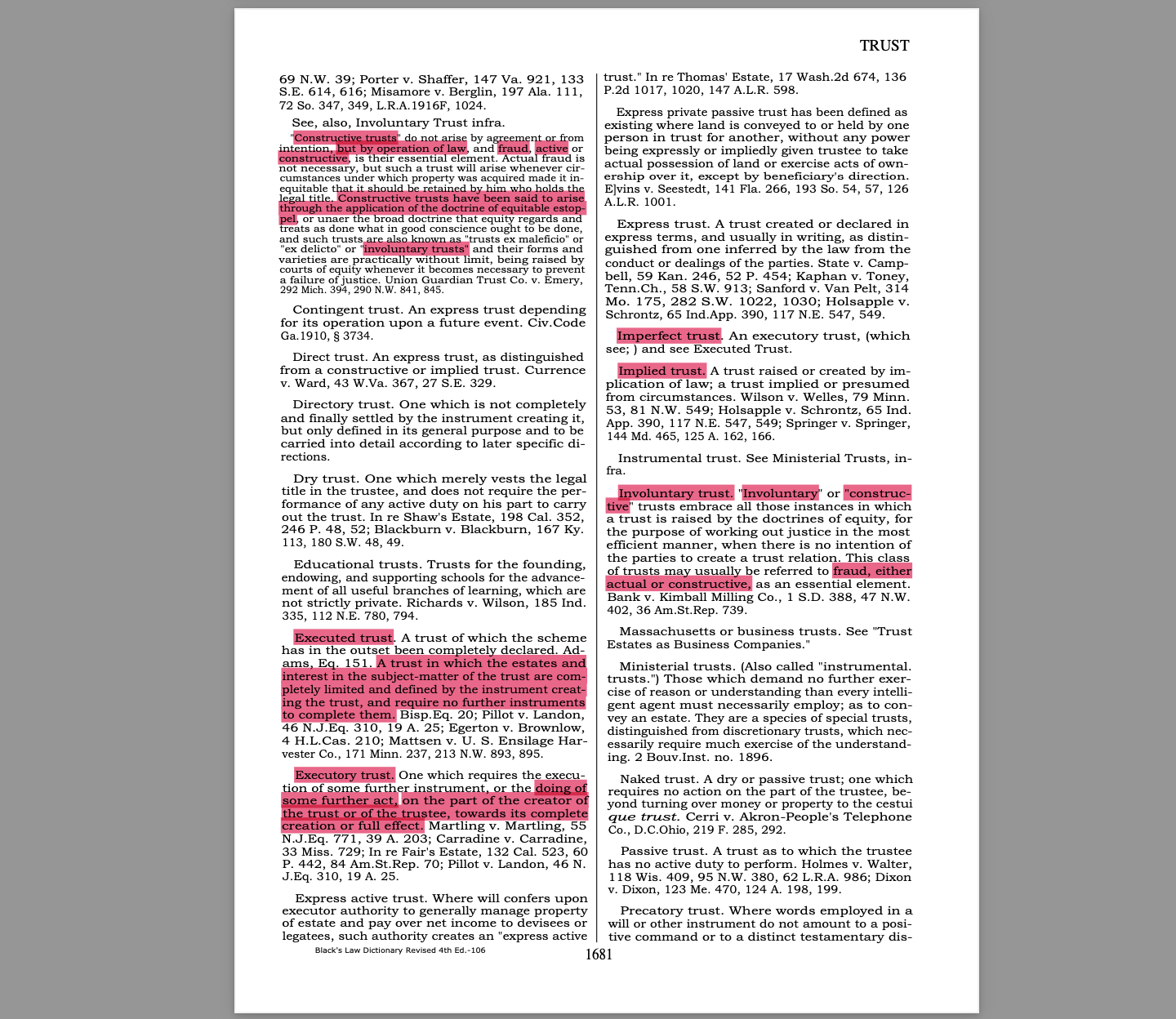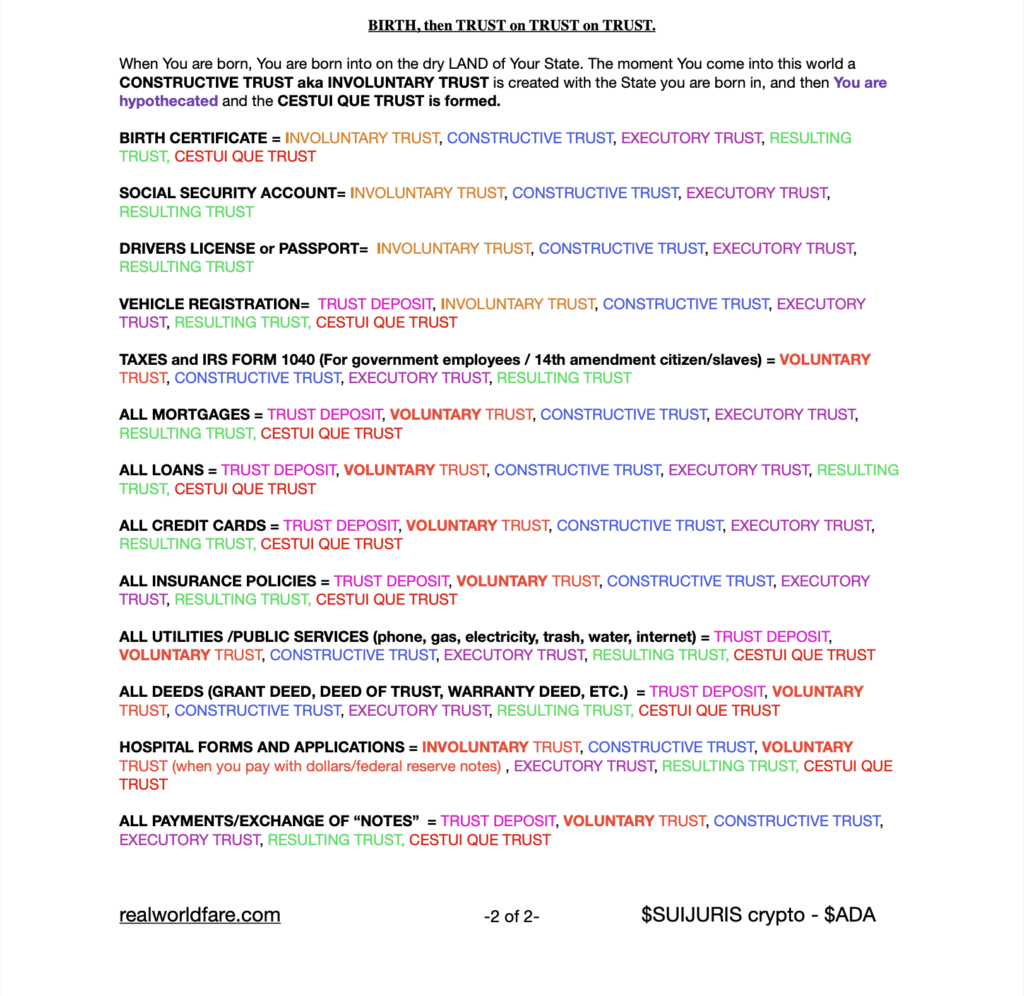TRUSTS: Where Fraud is seemingly permissible by the courts, government, and public servants/trustees.
TRUST. – In General
A right of property, real or personal, held by one party for the benefit of another. See Good- win v. McMinn, 193 Pa. 646, 44 A. 1094, 74 Am.St. Rep. 703; Boyce v. Mosely, 102 S.C. 361, 86 S.E. 771, 773; King v. Richardson, C.C.A.N.C., 136 F.2d 849, 856, 857. A confidence reposed in one person, who is termed trustee, for the benefit of another, who is called the cestui que trust, respecting property which is held by the trustee for the benefit of the cestui que trust. State ex rel. Wirt v. Superior Court for Spokane County, 10 Wash.2d 362, 116 P.2d 752, 755. Any arrangement whereby property is transferred with intention that it be administered by trustee for another’s benefit. Raffo v. Foltz, 106 Cal.App. 51, 288 P. 884, 886.
Cestui que trust: The person for whose benefit a trust is created or who is to enjoy the income or the avails of it.
Executory trust: One which requires the execution of some further instrument, or the doing of some further act, on the part of the creator of the trust or of the trustee, towards its complete creation or full effect. Martling v. Martling, 55 N.J.Eq. 771, 39 A. 203; Carradine v. Carradine, 33 Miss. 729; In re Fair’s Estate, 132 Cal. 523, 60 P. 442, 84 Am.St.Rep. 70; Pillot v. Landon, 46 N. J.Eq. 310, 19 A. 25.
Constructive trust: A trust raised by construction of law, or arising by operation of law, as distinguished from an express trust. Wherever the circumstances of a transaction are such that the person who takes the legal estate in property cannot also enjoy the beneficial interest without necessarily violating some established principle of equity, the court will immediately raise a constructive trust, and fasten it upon the conscience of the legal owner, so as to convert him into a trustee for the parties who in equity are entitled to the beneficial enjoyment. Hill, Trustees, 116; 1 Spence, Eq.Jur. 511; Nester v. Gross, 66 Minn. 371,
“Constructive trusts” do not arise by agreement or from intention, but by operation of law, and fraud, active or constructive, is their essential element. Actual fraud is not necessary, but such a trust will arise whenever circumstances under which property was acquired made it inequitable that it should be retained by him who holds the legal title. Constructive trusts have been said to arise through the application of the doctrine of equitable estoppel, or under the broad doctrine that equity regards and treats as done what in good conscience ought to be done, and such trusts are also known as “trusts ex maleficio” or “ex delicto” or “involuntary trusts” and their forms and varieties are practically without limit, being raised by courts of equity whenever it becomes necessary to prevent a failure of justice. Union Guardian Trust Co. v. Emery, 292 Mich. 394, 290 N.W. 841, 845.
Involuntary trust: “Involuntary trust” or “constructive trusts” embrace all those instances in which a trust is raised by the doctrines of equity, for the purpose of working out justice in the most efficient manner, when there is no intention of the parties to create a trust relation. This class of trusts may usually be referred to fraud, either actual or constructive, as an essential element. Bank v. Kimball Milling Co., 1 S.D. 388, 47 N.W. 402, 36 Am.St.Rep. 739.
Resulting trust: One that arises by implication of law, or by the operation and construction of equity, and which is established as consonant to the presumed intention of the parties as gathered from the nature of the transaction.
It arises where the legal estate in property is disposed of, conveyed, or transferred, but the intent appears or is inferred from the terms of the disposition, or from the accompanying facts and circumstances, that the beneficial interest is not to go or be enjoyed with the legal title. Lafkowitz v. Jackson, C.C.A.Mo., 13 F.2d 370, 372. See Sanders v. Steele, 124 Ala. 415, 26 So. 882. Farwell v. Wilcox, 73 Okl. 230, 175 P. 936, 938, 4 A.L.R. 156; Cummings v. Cummings, 55 Cal.App. 433, 203 P. 452, 455.
Trust deposit: Where money or property is deposited to be kept intact and not commingled with other funds or property of bank and is to be returned in kind to depositor or devoted to particular purpose or requirement of depositor or payment of particular debts or obligations of depositor. Also called “special deposit”. Maurello v. Broadway Bank & Trust Co. of Paterson, 114 N.J.L. 167, 176 A. 391, 394. See, also “Deposit.”
Voluntary trust: An obligation arising out of a personal confidence reposed in, and voluntarily accepted by, one for the benefit of another, as distinguished from an “involuntary” trust, which is created by operation of law. Civ.Code Cal. §§ 2216, 2217. According to another use of the term, “voluntary” trusts are such as are made in favor of a volunteer, that is, a person who gives nothing in exchange for the trust, but receives it as a pure gift; and in this use the term is distinguished from “trusts for value,” the latter being such as are in favor of purchasers, mortgagees, etc. A “voluntary trust” is an equitable gift, and in order to be enforceable by the beneficiaries must be complete. Cameron v. Cameron, 96 Okl. 98, 220 P. 889, 890; Logan v. Ryan, 68 Cal.App. 448, 229 P. 993, 996.
The difference between a “gift inter vivos” and a “voluntary trust” is that, in a gift, the thing itself with title passes to the donee, while, in a voluntary trust, the actual title passes to a cestui que trust while the legal title is retained by the settlor, to be held by him for the purposes of the trust or is by the settlor transferred to another to hold for the purposes of the trust. Allen v. Hendrick, 104 Or. 202, 206 P. 733, 740.
BIRTH, then TRUST on TRUST on TRUST.
When You are born, You are born into on the dry LAND of Your State. The moment You come into this world a CONSTRUCTIVE TRUST aka INVOLUNTARY TRUST is created with the State you are born in, and then You are hypothecated and the CESTUI QUE TRUST is formed.
BIRTH CERTIFICATE = INVOLUNTARY TRUST, CONSTRUCTIVE TRUST, EXECUTORY TRUST, RESULTING TRUST, CESTUI QUE TRUST
SOCIAL SECURITY ACCOUNT= INVOLUNTARY TRUST, CONSTRUCTIVE TRUST, EXECUTORY TRUST, RESULTING TRUST
DRIVERS LICENSE or PASSPORT= INVOLUNTARY TRUST, CONSTRUCTIVE TRUST, EXECUTORY TRUST, RESULTING TRUST
VEHICLE REGISTRATION= TRUST DEPOSIT, INVOLUNTARY TRUST, CONSTRUCTIVE TRUST, EXECUTORY TRUST, RESULTING TRUST, CESTUI QUE TRUST
TAXES and IRS FORM 1040 (For government employees / 14th amendment citizen/slaves) = VOLUNTARY TRUST, CONSTRUCTIVE TRUST, EXECUTORY TRUST, RESULTING TRUST
ALL MORTGAGES = TRUST DEPOSIT, VOLUNTARY TRUST, CONSTRUCTIVE TRUST, EXECUTORY TRUST, RESULTING TRUST, CESTUI QUE TRUST
ALL LOANS = TRUST DEPOSIT, VOLUNTARY TRUST, CONSTRUCTIVE TRUST, EXECUTORY TRUST, RESULTING TRUST, CESTUI QUE TRUST
ALL CREDIT CARDS = TRUST DEPOSIT, VOLUNTARY TRUST, CONSTRUCTIVE TRUST, EXECUTORY TRUST, RESULTING TRUST, CESTUI QUE TRUST
ALL INSURANCE POLICIES = TRUST DEPOSIT, VOLUNTARY TRUST, CONSTRUCTIVE TRUST, EXECUTORY TRUST, RESULTING TRUST, CESTUI QUE TRUST
ALL UTILITIES /PUBLIC SERVICES (phone, gas, electricity, trash, water, internet) = TRUST DEPOSIT, VOLUNTARY TRUST, CONSTRUCTIVE TRUST, EXECUTORY TRUST, RESULTING TRUST, CESTUI QUE TRUST
ALL DEEDS (GRANT DEED, DEED OF TRUST, WARRANTY DEED, ETC.) = TRUST DEPOSIT, VOLUNTARY TRUST, CONSTRUCTIVE TRUST, EXECUTORY TRUST, RESULTING TRUST, CESTUI QUE TRUST
HOSPITAL FORMS AND APPLICATIONS = INVOLUNTARY TRUST, CONSTRUCTIVE TRUST, VOLUNTARY TRUST (when you pay with dollars/federal reserve notes) , EXECUTORY TRUST, RESULTING TRUST, CESTUI QUE TRUST
ALL PAYMENTS/EXCHANGE OF “NOTES” = TRUST DEPOSIT, VOLUNTARY TRUST, CONSTRUCTIVE TRUST, EXECUTORY TRUST, RESULTING TRUST, CESTUI QUE TRUST
